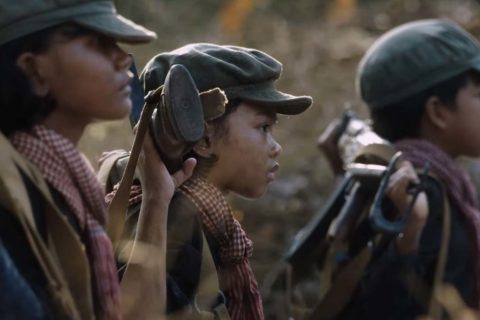First They Killed My Father: Why Angelina Jolie’s New Film Might Be Called Problematic
Angelina Jolie’s new Netflix film, First They Killed My Father, premiers at Toronto’s International Film Festival in September, but already it has attracted mass controversy. A Vanity Fair profile on Jolie alleged that casting directors devised a “game” in which an impoverished child was given money, asked “to think of something she needed the money for,” only to then have the money be snatched away. The unconventional casting method was criticized as being cruel and abusive, and Jolie has since disputed the article, calling it “false and upsetting.”
This, however, may not be the only controversy Jolie faces with her latest passion project.
Jolie’s First They Killed My Father is based on the bestselling memoir of Cambodian genocide survivor Loung Ung, whose testimony chronicles the brutality of the Khmer Rouge through a young child’s perspective; from her charmed life as a five-year-old in Phnom Penh, to her narrow escape from genocide at age nine. With its illustrative personal account, the novel introduced thousands of readers to a genocide that often receives far too little attention.
For an international audience, violent human injustice becomes easier to digest and confront through a child’s vivid emotions, blind trust, and naivety. But this innocence, which is commonly credited for First They Killed My Father’s success, troubles critics and Cambodian nationals who feel the young voice of Ung’s memoir simplifies complex concepts of revolution, war, and genocide.
The first common critique of First They Killed My Father is that Loung Ung cannot possibly remember her Cambodian life in the gruesome detail described in the novel. There are two Ung’s present in the story: the five-year old Cambodian child who lost her voice to survive, and the 30-something year old American who has a degree in political science and is a United Nations representative. Cambodian Loung may be the voice of the story, but American Loung is its author.
With a child narrator as the puppet of an adult writer, critics believe Ung should have used her strings to integrate an accurate historical and cultural context. Adult-American Ung has the resources and knowledge to explain more, but she doesn’t. Hers is a story of good versus evil, not of politics, ideology and self-awareness.
Sody Lay, an American human rights advocate who lectures on the Cambodian American experience, has gone so far as to call the testimonial “a sensationalization and over-dramatization of the Killing Fields,” and has accused Ung of “making her story easily digestible” for Western audiences for profit’s sake.
Turning the text into a widely disseminated blockbuster film may not help dispute these strong worded allegations. Hollywood has a habit of watering down history for the sake of entertainment: In the same vein that that Steven Spielberg’s Schindler’s List has been charges with trivializing the Holocaust, First They Killed My Father may be charged with trivializing the Cambodian Genocide. But just as Schindler’s List became a hallmark of education about the suffering of European Jews, let’s hope Jolie’s film inspires a new generation to further explore the horrors faced by the Cambodian people.
It’s bleak to think that the Western world requires a big-budget film with an A-list director to understand genocide – but maybe that’s just the way it is. It’s better for us to know a little, than to be left completely in the dark.
Watch the first trailer for First They Killed My Father, which premiers on Netflix September 15.








